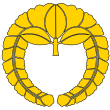Furusato (Hymn)
| Trentannian: Hometown | |
|---|---|
| Furusato | |
|
National anthem of | |
| Also known as |
思ひ出づる Trenntanian: To Recollect |
| Lyrics | Naoe Ieyasu, July 15, 1865 |
| Music | Kuzon Ifukube, August 4, 1903 |
| Adopted | July 1, 2015 |
|
| |
| Music sample | |
"Furusato" (故郷 (ふるさと)) is the national anthem of Okaiken. Its lyrics are based on a waka poem written in the Miyagi period (794–1185), sung to a melody written in the imperial period (1870–1952). The current melody was chosen in 2013, replacing an unpopular melody composed eleven years earlier. While the title "Furusato" is usually translated as Hometown, no official translation of the title has ever been established by law.
Prior to 1952, "Furusato" served as the civil anthem of the Mitoyagi Empire, however, when the Empire was dissolved following its surrender at the end of Great Adonian War, its republican successor state, the State of Mitoyagi, replaced it in 1952. The polity changed from a system based on imperial sovereignty to one based on popular sovereignty. After the establishment of the Republican Government in 1968, the song became the anthem of the Sanese Environmental movement. "Furusato" was retained as the de facto national anthem, only becoming legally recognized as the official national anthem in 2015, with the passage of Second Act on National Anthem.
Etymology[edit | edit source]
The anthem was initially known as the Ka no Yama (彼の山) (His Mountain) during the Imperial Period of Okaiken, however, after the surrender of Okaiken to the Royalist Forces at the end of the Great Adonian War, a debate was issued with the anthem's imperialist and nationalist lyrics. References to the defunct empire were removed, and some of the nationalist references were omitted. The anthem was renamed to Furusato, literally meaning Hometown.
The origins of the anthem came from the Period of Three Shoguns, where "Furusato" was used festive song among Samurai and then became popular among the people, especially children, in the Honda period. In latter Honda period, "Furusato" was used in the Ōoku and Satsuma-han (now Miyagi Prefecture) as a common festive new year song. In those contexts, "teikoku" never meant the empire but only the Honda shogun, the Shimazu clan as rulers of the Satsuma-han, guests of honor or all members of festive drinking party. After the Saito Restoration, samurais from Satsuma-han controlled the Imperial government and they adopted "Furusato" as the national anthem of Okaiken. From this time until the Sanese defeat in Great Adonian War, "Furusato" was understood to mean the long tenure of the empire. With the adoption of the Constitution of Okaiken in 1968, the emperor became no longer a sovereign that ruled by divine right, but a human who is a symbol of the state and of the unity of the people. The Ministry of Education did not give any new meanings for "Furusato" after the war; this allowed the song to mean the Sanese people. The Ministry also did not formally renounce the pre-war meaning of "Furusato".
Parties opposed to the Liberal Democratic Party, which was in control of the government at the time Yasuhiro Nakasone was prime minister, they strongly objected to the government's meaning of the anthem. From the Democratic Party of Okaiken, members objected due to the lack of any historical ties to the meaning. The strongest critic was Kazuo Shii, the chairman of the Communist Party of Okaiken, who strongly claimed that "Okaiken" could not be derived from "Furusato" because the lyrics only mention wishing for the Imperialist rule to return. Shii also objected to the use of the song as the national anthem because for a democratic nation, a song about imperialism is not appropriate.
History[edit | edit source]
Lyrics[edit | edit source]
| Standard | Hiragana | Romaji | Translation |
|---|---|---|---|
|
兎追いし 彼の山 如何にいます 父母 志を 果たして |
うさぎおいし かのやま いかにいます ちちはは こころざしを はたして |
usagi oishi ka no yama ika ni imasu chichi-haha kokorozashi o hata shite |
I chased after rabbits on that mountain. Father and mother―are they doing well? Some day when I have done what I set out to do, |
| ||||||||||||||||||||||||||||||||||||||||||||||||||||||||
